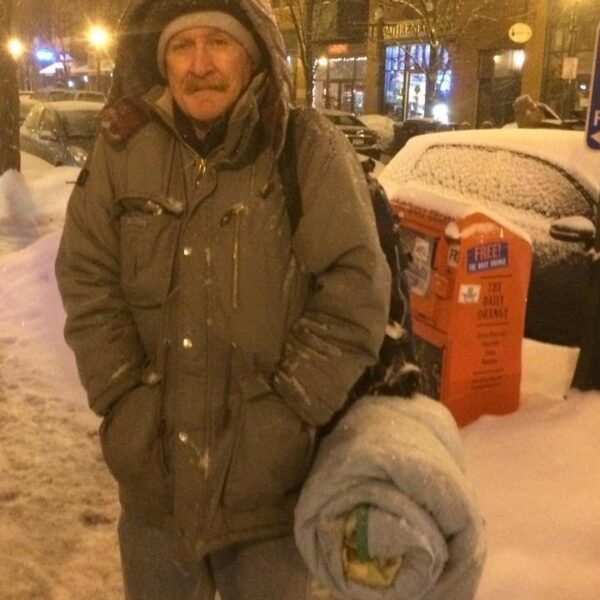From Words to Weapons: Legal Director Eric Tars Shares How Rhetoric Fuels Violence Against Homeless People
Trigger Warning: The following article contains graphic imagery of violence against homeless people and death.
The haunting scenario is certainly not new. A homeless man, roughly 51 years of age, was brutally gunned down on the very same Florida streets he was forced to sleep on.
That homeless man was Clinton Dorsey, whom friends and family often referred to as Clint. He was described as a warm and caring individual, graduating from Dexter High School in 1990. Clint was a loving father of three.
Little is known about Mr. Dorsey aside from the fact that he became homeless and was fatally shot. That act of brutality against our unhoused neighbor was committed by an anger management therapist named Travis McBride, who was 46 at the time the alleged murder took place.
The bitter irony of the situation cannot be understated. It is said that McBride, who, according to his website, specialized in various mental health issues, particularly anger management. Court records suggest this was not McBride’s first or only violent outburst. In the past, he has been accused of choking his spouse, an action he vehemently denies.
Witnesses shook with fear when speaking to authorities. They described the murder as premeditated. One eyewitness claimed Travis told her he intended to murder Clinton Dorsey the previous night, following a dispute over McBride’s dog walking practices.
The therapist and the homeless man crossed paths on that unfortunate day, and the former was later seen cleaning up pools of blood, searching for shells left behind by his discharged weapon, and allegedly stashing Clint’s lifeless body in his trunk.
Homeless People Are More Likely to be Victims of Violence than Perpetrators of Violence
“We’ve known for years that homeless people are far more likely to be victims of crimes than they are to be perpetrators of them, despite popular public perceptions,” said Legal Director Eric Tars of the National Homelessness Law Center in an exclusive discussion with Invisible People. “And we know that as governments ramp up their anti-homeless rhetoric, violence will inevitably trickle from the top down.”
“Former President Trump was recently talking about people experiencing homelessness. He was describing them as dangerous and deranged,” Eric continued. “This kind of language can instill rage and encourage violence against the homeless population.”
“At every other level of government, when they criminalize homelessness, that gives the tacit seal of approval from the locality that says, you know, homeless people aren’t abiding by our laws. It incorrectly asserts that they are a threat to society somehow.”
From the Top Down: Harmful Rhetoric Encourages Violence Against the Unhoused Population
Clinton Dorsey’s murdered corpse is a grim reminder of what such attacks might look like. And his alleged killer, an otherwise reputable mental health professional, felt so justified in his crime that he bragged of the act to neighbors even before it happened.
Committing murder with the expectation of praise is something many of these perceived vigilantes seem to take pride in. They stalk the homeless community, hunting down our fellow human beings in a vile, almost animalistic way. Perhaps the most notorious and recent example of this took place when Jordan Neely was murdered on public transportation in front of an on-looking crowd.
Expert Eric Tars says we should brace for an uptick in this kind of violent crime against our unhoused neighbors.
“We’re going to see these kinds of attacks more frequently, just as we have been over the past few years,” he said. “Tragically, we’ve seen serial killers going after people experiencing homelessness. We saw the murderer of Jordan Neely in New York being celebrated by right-wing media. We’ve seen politicians perpetuate the lie that all or most homeless people are criminals. And these are the results of that lie.”
“This is making our communities less safe, not more safe! Promoting harmful rhetoric goes hand in hand with promoting violent crime and acts of hate against people experiencing homelessness. So, it is all on a continuum, whether state-sanctioned violence or individual vigilante acts. It all comes out of this narrative and a continuum of actions and policies against people experiencing homelessness,” Eric concluded.
Talk To Your Representatives About Making Our Streets Safer by Making Housing a Human Right
Every passing day, 20 homeless people pass away. They die stripped of dignity. They often go unnamed and unremembered. Too many of them are viciously attacked and murdered, their killers given the reigns to roam free.
As Senior Policy Director Eric Tars put it, “We need our elected officials to stand up and say that this is not acceptable, and we need people to be put in adequate housing so that they aren’t vulnerable due to living on the streets in the first place. That’s the real public safety win-win solution that works for everybody.”
Please take a moment to explain this point to your local legislators and demand that they make housing a human right for all.












